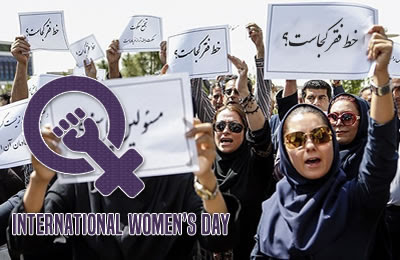 |
| Iran :Voice of the Oppressed Women |
Iran:Do Women have
any rights in Iran?
From the standpoint of
the ruling regime and its dictated rules:
Women's most important
responsibility is homemaking and raising children.
Women cannot leave
their homes or travel abroad without their husbands' permission.
Women covering up is an
essential principle which must be observed and safeguarded.
Women are not entitled
to custody of their children.
Women's main occupation
should not be jobs and employment.
Women must not sing
since their voice is "Satanic".
Women must not enter
sports stadiums since they are male environments.
Women must not defend
themselves against rape otherwise they are executed.
Women are not trust
worthy enough to be granted sensitive responsibilities.
Women are not trust
worthy enough to be granted sensitive responsibilities.
Women are not qualified
to serves as a judge or president.
And the list goes on…
A brief glance over
women's rights in today's Iran, leads us to conclude that women are sub-humans
who virtually do not have any rights in life; but what is the truth?
The truth is that
Iranian women have stood up to the mullahs' massive repression and have never
surrendered to the misogynous regime.
Many died under
torture, were executed by firing squads or kissed their hanging noose but did not
budge and iota on the most important demand and needs of their nation, that is
national sovereignty and democratic freedoms.
Many preferred to spend
long years behind bars in the cold of dungeons and prison cells and go on
hunger strike, forsaking their homes, families and loved ones. Others rose up
everywhere in any factory, university and school to demand their rights.
Therefore, it could be
rightly said that the most prominent distinction between the Iranian Resistance
and the regime ruling Iran is on women's issue.
In 1985, the National
Council of Resistance of Iran adopted a platform on the rights of women
containing 13 articles. Then in September 1988, the Iranian Resistance's
President-elect Maryam Rajavi completed that plan and offered a new ten-point
plan on the rights of women to guarantee women's rights in the free Iran of
tomorrow.
Contrary to the
misogynous laws of the clerical regime, the plan recognizes all rights of women
as equal and independent human beings and provides them the opportunity to
advance in education, science, society, economy and politics to the highest
levels.
No comments:
Post a Comment